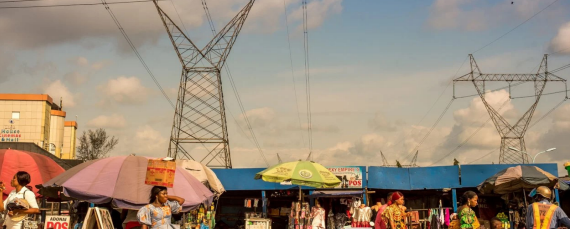Business
AfDB Approves $500m Loan To Boost Nigeria’s Electricity Access

The African Development Bank (AfDB) Group has approved a $500 million loan to Nigeria to finance the first phase of the Economic Governance and Energy Transition Support Programme (EGET-SP). This program aims to accelerate the transformation of Nigeria’s electricity infrastructure and improve access to cleaner sources of energy.
The Nigerian government launched its energy transition plan in August 2022 and passed a new Electricity Act in June 2023, decentralizing the electricity supply industry and setting the stage for increased investments by subnational governments and the private sector.
The loan will help close the financing gap of the government’s budget in the 2024/2025 fiscal year, supporting the implementation of the new Electricity Act and the Nigeria Energy Transition Plan. The plan envisions the development of 250 GW of installed electricity capacity by 2050, with 90% from renewable sources.
The Economic Governance and Energy Transition Support Programme will also support the implementation of these policies, helping deliver much-needed upgrades of Nigeria’s electricity infrastructure and fast-tracking the country’s efforts to transition millions of households and businesses to cleaner and renewable sources of energy.
This loan is in line with the AfDB’s new 10-year strategy and priorities, and the New Deal on Energy for Africa, which seeks to achieve universal access to modern energy by 2030.
Business
Mshel Homes Unveils The Groove, a Premium Lifestyle Estate in Wuye

Mshel Homes Unveils The Groove, a Premium Lifestyle Estate in Wuye
Link Image:
https://drive.google.com/file/d/11-uF8z9efl0lVuv7MdUHQ3VnTkEps4Sb/view?usp=sharing
Mshel Homes has continued to strengthen its reputation as one of Nigeria’s most forward-thinking real estate developers, delivering projects that prioritise longevity, sustainability, and long-term value creation. Over the years, the company has consistently demonstrated intentional planning and execution across notable developments such as Hutu Exclusive, Hutu Pent Haven, Signature Residence, Harmony Hills, and Mshel Horizon, among others, within the Federal Capital Territory.
Building on this legacy, Mshel Homes has unveiled The Groove, a premium residential estate in the highly sought-after Wuye district of Abuja. Positioned within one of the city’s most prestigious neighbourhoods, The Groove is designed to offer a refined blend of luxury, comfort, leisure, and modern urban living.
Spanning approximately 3.06 hectares, the estate integrates lifestyle-driven amenities that support wellness and sustainability. Planned features include a thoughtfully designed recreational area, a swimming pool that encourages relaxation and social bonding, a state-of-the-art tennis court promoting physical activity and mental clarity, and landscaped green spaces that reinforce a nature-forward living experience.
Wuye remains a prime destination for high-value residential developments, favoured by individuals seeking an elevated standard of living beyond the conventional. Its strategic location provides seamless access to Abuja’s major districts, including the Central Business Area, Utako, Jabi, and Life Camp, making it both a lifestyle and investment-driven choice.
The Groove offers 200sqm, 350sqm, and 500sqm residential plots, alongside apartments, each supported by carefully curated architectural prototypes. These offerings provide flexibility for homeowners and investors alike, with use cases ranging from private residences and luxury rentals to shortlet apartments and strategic land banking.
Currently, all properties are in the pre-sale phase, offering a compelling opportunity. Early acquisition allows buyers to secure assets at lower entry points, ahead of infrastructure development and market appreciation. Historically, estates that progress from pre-entry to active development witness significant value growth, positioning early investors for sustainable capital appreciation.
Mshel Homes reinforces its commitment with The Groove by delivering estates that balance lifestyle excellence with long-term investment value anchored in credible execution and strategic location.
Interested buyers and investors seeking early access to The Groove are encouraged to act promptly, as pre-sale allocations are limited and entry prices are subject to upward review once development commences. For enquiries and site Inspections contact @mshelhomes across all social media platforms or 09069951704 or 08133933449 today.
Business
A Home Worth Coming Back To: The Signature Residence by Mshel Homes

A Home Worth Coming Back To: The Signature Residence by Mshel Homes
For many Nigerians, especially those in diaspora, owning properties back home is a statement of belonging, a plan for family, and a piece of home you can return to. In Wuye, Abuja, The Signature Residence by Mshel Homes is an emerging opportunity that answers those needs while promising integrity and long-term value.
The Signature Residence is currently at the development stage. Buying now means securing a position in a thoughtfully planned community before it is completed. That early position is often what turns a property purchase into a legacy.
Why this project matters to the diaspora?
Mshel Homes is known for delivering projects on time and with clear documentation. For returnees and investors abroad, reliability matters more than marketing language. The Signature Residence is presented as an estate built with that same practical attention to title verification, infrastructure planning and professional delivery. It is aimed at buyers who want assurance that their investment is protected and that their family will have a secure, well-serviced place to call home.
Estate features and infrastructure
The master plan for The Signature Residence focuses on creating a self-contained, livable environment with amenities and infrastructure that reduce daily friction and improve quality of life. Key features in the design include:
A modern clubhouse for social gatherings and community events.
A private lounge for residents and guests.
A swimming pool and mini sports centre for recreation and wellness.
A dedicated water treatment plant to ensure reliable potable water on site.
A central gas system for safer and more convenient cooking and service provision.
Gym and fitness centre equipped with modern workout facilities to support an active, balanced lifestyle within the comfort of the estate.
Planned internal road networks and landscaping to create an orderly, secure neighbourhood.
Smart home features for seamless control of lighting, temperature, and security, allowing residents to manage their homes conveniently from anywhere.
Choice of interior design that gives homeowners the freedom to personalise spaces with premium finishes, colours, and fittings that reflect their individual style.
These features are designed to make the estate feel complete from the moment you or your family take residence, while also supporting long-term value appreciation as the neighbourhood matures.
Available property options and pricing
The Signature Residence offers a range of home types for families of different sizes and investment goals. Current options and prices are as follows:
• 3-bedroom apartment: ₦158,676,720
• 5-bedroom terrace duplex: ₦310,258,063.40
• 5-bedroom semi-detached duplex with 1 BQ: ₦394,757,992.30
• 6-bedroom fully detached duplex: ₦601,396,057.20
Each option was priced to reflect both the premium positioning of the development and the long-term growth potential of Wuye and central Abuja.
Location advantages
Wuye combines ease of access to Abujas business districts with a quieter residential atmosphere. The area is close to schools, hospitals and commercial centres, which is important for families and for renters should you decide to let the property. For diaspora investors, Wuye offers a balanced profile that supports both lifestyle use and capital appreciation.
How to find out more
Opportunities at this stage will not remain open indefinitely. If you would like to discuss reservation options, development timelines, or tailored purchase plans for diaspora buyers, reach out to Mshel Homes via social media at @mshelhomesor by calls and WhatsApp at +2349069951704and +2348133933449. The team can provide all the details needed to secure a unit.
Analysis
Nigeria’s Tax Reforms and the Diaspora, by Boniface Ihiasota

Nigeria’s Tax Reforms and the Diaspora, by Boniface Ihiasota
For Nigerians living abroad, tax policy at home has often felt distant, until the recent overhaul of Nigeria’s tax framework brought it sharply into focus. The passage of the Nigeria Tax Act, which took effect from January 1, 2026, triggered anxiety across diaspora communities, fuelled largely by fears that earnings abroad or personal remittances would now attract Nigerian tax. A closer reading of the reforms, however, shows that Nigeria is not charting a radical or punitive course against its diaspora. Instead, it is aligning more closely with internationally accepted principles of taxation based on residency and income source.
At the heart of the reform is a clearer definition of tax residency. Under the new framework, individuals who spend 183 days or more within Nigeria over a 12-month period, or who maintain a permanent home or substantial economic ties in the country, are considered tax residents. Only such residents are liable to tax on their worldwide income. Nigerians who live and work abroad and do not meet these conditions remain non-residents and are taxable in Nigeria only on income sourced within the country. This distinction is critical because it dispels the widespread notion that citizenship alone now triggers tax liability.
The Federal Government, through the Presidential Fiscal Policy and Tax Reforms Committee, has repeatedly clarified that income earned abroad by non-resident Nigerians is not subject to Nigerian tax, even when such income is remitted home. Remittances sent to family members for upkeep, education, healthcare or personal support are not classified as taxable income. This position is particularly significant given that Nigeria received an estimated $20.5 billion in diaspora remittances in 2023, according to World Bank data, making it one of Africa’s largest recipients. Taxing such flows would not only have been impractical but economically counterproductive.
When viewed in a global context, Nigeria’s approach is far from unusual. Most countries operate either a residence-based or source-based tax system. In the United Kingdom, for instance, non-residents are taxed only on UK-sourced income, such as rental income from property located in Britain. Canada applies similar rules, taxing non-residents only on income earned within Canada, while residents are taxed on worldwide income. China also follows a residency threshold of 183 days, beyond which global income becomes taxable. Nigeria’s reforms fit squarely within this international pattern.
Only a handful of countries take a different approach. The United States is the most prominent example, taxing citizens on their worldwide income regardless of where they live. U.S. citizens abroad are required to file annual tax returns and comply with foreign account reporting rules, though credits and exclusions exist to mitigate double taxation. Eritrea operates a similar system, levying a two per cent diaspora tax on its citizens overseas. Nigeria has explicitly rejected this model, opting instead for a system that balances revenue generation with global mobility and fairness.
Where tax obligations do arise for Nigerians in the diaspora is in relation to Nigerian-sourced income. Rental income from property in Abuja or Lagos, dividends from Nigerian companies, or profits from businesses operating within Nigeria remain taxable, regardless of where the individual resides. In many cases, such taxes are collected through withholding mechanisms and treated as final, reducing administrative burdens on non-residents. This is consistent with global practice and reflects the principle that income should be taxed where economic value is created.
The reforms also strengthen Nigeria’s use of Double Taxation Agreements, which the country has signed with several nations including the United Kingdom, Canada, China and South Africa. These treaties are designed to prevent the same income from being taxed twice and to provide clarity on taxing rights between countries. For Nigerians abroad who may still qualify as tax residents due to time spent at home or strong economic ties, these agreements offer essential safeguards.
Beyond individual taxation, the reforms signal a broader shift in Nigeria’s fiscal strategy. By simplifying tax laws, adjusting personal income tax thresholds and expanding digital compliance systems, the government aims to widen the tax net without placing undue pressure on vulnerable groups or discouraging diaspora engagement. For Nigerians abroad, this clarity matters. Many invest in property, startups and family enterprises back home, and uncertainty around taxation has long been a deterrent.
Ultimately, the significance of Nigeria’s tax reforms for the diaspora lies not in new burdens, but in clearer rules. They reaffirm that Nigerians abroad are not taxed simply for being Nigerian, nor for supporting families at home. Instead, tax obligations are tied to presence, economic activity and income source, in line with global norms. For a country whose diaspora plays a vital role in economic stability and development, this alignment is not just sensible policy, but a necessary reassurance.
-

 News6 days ago
News6 days agoTrump Hails ‘Turnaround for the Ages’ in Record 110-Minute Address
-

 News6 days ago
News6 days agoMexico in Turmoil After CJNG Kingpin Killed in Military Operation
-

 Analysis6 days ago
Analysis6 days agoSavannah Shield and the Security Recalibration of Kwara State
-

 Analysis6 days ago
Analysis6 days agoWho Is After Peter Obi? By Boniface Ihiasota
-

 News6 days ago
News6 days agoCARICOM Chair Engages Guyana in Fresh Push for Regional Integration
-

 News6 days ago
News6 days agoUK Court Hears Recordings in Diezani Bribery Trial









